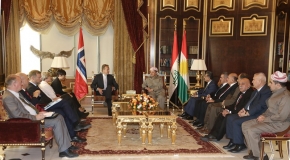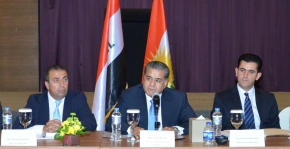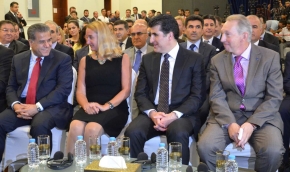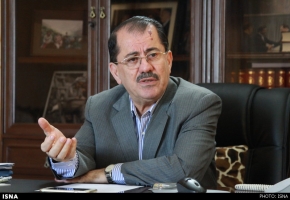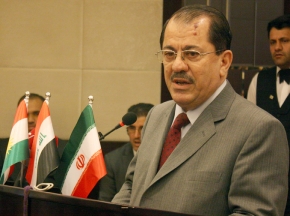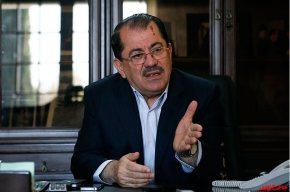main user
Erbil, Kurdistan Region, Iraq (dfr.gov.krd) - The Chief of Staff to the Kurdistan Region President, Dr Fuad Hussein, and the Head of the Department of Foreign Relations, Minister Falah Mustafa, today briefed diplomats and representatives of international organizations on the latest security, humanitarian and political developments.
Minister Mustafa thanked diplomats for attending the session and for their confidence in the stability and security of the Kurdistan Region. He gave an overview of the security, humanitarian and political developments in the Kurdistan Region.
The Minister expressed appreciation of the people of Kurdistan Region to the members of the Counter-ISIS Coalition for supporting Kurdistan Region in the fight against international terrorism. He also thanked members of the international community, UN agencies and international organizations for providing humanitarian assistance to the refugees and displaced people who have fled to the safety of the Kurdistan Region.
Dr. Fuad Hussein, Chief of Staff to the President, briefed the diplomats on the political and legal challenges facing the issue of the presidency of Kurdistan Region. He announced “We are taking the legal and political challenges pertaining to the issue of presidency very seriously. The five major political parties are engaged in lengthy negotiations to reach a consensus on that matter.”
“We are a democracy in the making. Our political parties have chosen to resolve their differences through dialogue and negotiation. We consider this as a very positive development in the democratic process of the Kurdistan Region,” the Chief of Staff to the President added.
During the meeting several diplomats reiterated their support for the Kurdistan Region and praised democratic maturity of Kurdish political parties.
On behalf of the diplomatic corps, the Consul General of Palestine, who serves as the dean of the diplomats, Nazmi Hazouri, thanked the DFR for the briefing and highlighted the importance of a united and strong Kurdistan Region for the regional peace and stability.
Consul General of the Republic of France, Alain Guépratte, conveyed “The French authorities are closely monitoring developments in the Kurdistan Region. We have confidence in the Kurdistan Region and we fully support the region’s effort to overcome the current challenges. We believe that the political parties will be able to reach a consensus on the issue of the presidency of the Kurdistan Region.”
Head of the Consular office of the Republic of Italy, Carmelo Ficarra, stated, “Italy shares the same sentiment of France towards Kurdistan Region. Italy believes in the stability and security of the Kurdistan Region and it will continue to support the region in all fronts.”
Head of the UNAMI Regional Office in Erbil, Sokol Kondi, expressed the support of the United Nations to the stability of the Kurdistan Region. “Political differences need to be resolved through dialogue and negotiation. I commend the Kurdish political parties for seeking democratic tools to reach an agreement on the issue of Presidency of the Kurdistan Region, this is a positive step forward in the democratic process of this region,” he added.
Several other diplomats including representatives of UK, Iran and Kuwait exchanged thoughts on the developments in the Kurdistan Region.
The meeting was attended by representatives of Palestine, Republic of France, United Arab Emirates, Republic of Turkey, People’s Republic of China, United Kingdom, Republic of Italy, Republic of South Korea, Federal Republic of Germany, Republic of Romania, Islamic Republic of Iran, Russian Federation, Republic of Hungary, Hashemite Kingdom of Jordan, State of Kuwait, Kingdom of Netherlands, Arab Republic of Egypt, United States of America, Czech Republic, Canada, Republic of Bulgaria, Republic of Sudan and UNAMI.
Kurdistan Region President Masoud Barzani welcomed Norway’s Foreign Minister Borge Brende and Norway’s Defense Minister Ine Marie Eriksen Søreide in his office in Salahaddin today.
In their meeting, President Barzani and the Norwegian Ministers discussed Norway’s role, as part of the international coalition against ISIS, in supporting the peshmerga forces with training and capacity building. They also discussed political developments in the country and in the wider region.
Foreign Minister Brende commended the role of President Barzani in leading the peshmerga forces against ISIS terrorists and for his personal involvement in supervising battles in the front lines against the terrorists. He reiterated his country’s commitment to continue to support the peshmerga forces in confronting the terrorists’ threat.
President Barzani thanked Norway’s for its support and expressed his hope that this cooperation can be further strengthened. He said the with the support of Norway and other coalition partners the peshmerga forces have been able to stand up to the ISIS terrorists and inflict many losses on them.
On the political developments in Kurdistan, the President said that what is happening is a natural outcome of a democratic process, emphasizing that the political disputes between the parties have not in any way affected the morale of the peshmerga forces.
The President and the Norwegian delegation also discussed developments in Syria and in Turkey. On the current conflict between Turkey and the PKK, the President said that the only solution is going back to negotiations, and the KRG is ready to help restart the peace process.
Kurds Press/ Nazem Dabbagh the official representative of Kurdistan Regional Government of Iraq in Iran through an interview with Kurdish news site, Avineh, answered some questions relating about current concerns of the Region especially the position of the presidency of Kurdistan which has turned out to be a crisis in the Region for it is approaching to the end of Mr. Barezani’s presidency period, and Iran’s role in these changes as followed:
Relating to the rumors about the role of General Qassem Soleimani to extend the presidency of the Region for another two years Dabbagh claimed to be ignorant of that. Concerning with type of Iran’s interfere in ISIS concern Dabbagh continued: Iran’s policy is relied on supporting the union and correlation of political movements of the Kurdish Region and helping solve the problems and differences. It desires to deal with the problems according to rules of the Region, but I have no more information about its details.
About the positions of Dr. Reza Amiri Moghaddam, the Middle East general manager of national security supreme council of Iran expressed at the presence of Dabbagh and the officials of the Region he said: the meeting in which I presented I noticed that Iran’s view toward the presidency of the Region is that the presidency concern should be solves with the participation and presence of parties and through talking as the Regional Government.
He added: in all meeting and conventions I did not present but in Dr. Ahmadi Moghaddam’s. Iran desires important problems should be solves with cooperate of all parties of the Kurdistan Region. In addition Dabbagh considered the common positions of Patriotic Union, Islamic Union (Guran) and Islamic Group (Komel) to get together effective and said what is said about Iran’s role about this is just rumor.
The reporter of Avineh asked Mr. Dabbagh: Does Iran, in your opinion, have an active present by August 20 to prevent unrest and challenges in the Region?’, Dabbagh replied: now if any unrest and tension occurs in the Region, it will affect Iran and Turkey, in spite of not having detailed information about this, however, I know that after its agreement with 5+1 Iran is trying to act according to plan in order to meet its goals of the agreement; and all countries that were Iran’s allies at tough and hard times have to remain as friends. Iran also has to be their ally as the peace time which Kurds is one of them that during its fighting and being homeless have kept pace with Iran. For this the true policy between Iran and Kurds is that the problems remove. For calmness and stability of the region I.R. of Iran is trying, otherwise why does America agree with Iran and does Iran? All these reasons will lead to stability and agreement.
Erbil, Kurdistan Region (dfr.gov.krd) – The KRG Department of Foreign Relations (DFR), in coordination with the KRG Department of non-Governmental Organization (DNGO) and the KRG Joint Crisis Coordination Center (JCC) today hosted a special session to discuss cooperation between relevant KRG authorities and the active International non-Governmental Organizations (INGO) in the Kurdistan Region.
Minister Falah Mustafa, Head of the KRG Foreign Relations, thanked the representative of INGOs for attending the session and expressed the gratitude of the KRG for their presence and contribution during this challenging time.
Minister Mustafa stated that the KRG fully supports the mission of INGOs in the Kurdistan Region and that the relevant authorities of the government stand ready to provide the needed assistance in order to ensure the success of the mission of INGOs.

During the session, Head of the KRG DNGO, Mr. Akram Mohammed, gave an overview of the mission and responsibilities of the department and expressed the readiness of the DNGO to fully cooperate with the INGOs and to support their activities in the region.
Head of the JCC, Mr. Hoshang Mohammed, also briefed the representatives of INGOs on the mission of the newly established JCC and discussed ways of building a proper mechanism to build and strengthen understanding and cooperation between JCC and active INGOs in Kurdistan.
During the meeting, several representatives discussed issues and challenges facing the INGOs and exchanged views on how to further consolidate cooperation between KRG and INGOs.
The meeting was attended by representatives of 40 INGOs as well as several officials from DFR, DNGO and JCC.
Erbil, Kurdistan Region (dfr.gov.krd) – In the presence of the Kurdistan Regional Government Prime Minister Nechirvan Barzani, Ambassador of the European Union in Iraq Jana Hybaskova, Head of KRG Foreign Relations Falah Mustafa, several KRG ministers and members of the diplomatic community, today the European Union Delegation Liaison Office in Erbil, Kurdistan Region was officially opened.
Prime Minister Barzani thanked the High Representative of the European Union for Foreign Affairs and Security Policy, Ms. Federica Mogherini and Ambassador Hybaskova for their important role in the opening of the EU liaison office in Erbil.
“We seek the support of the EU to enhance our system of governance and we believe that the Kurdistan Region is entitled to receive its fair share of assistance from the EU-Iraq Partnership and Cooperation Agreement, which was signed on 11th of May, 2012,” Prime Minister Barzani added.
The KRG Prime Minister expressed appreciation and gratitude of the people and the government of Kurdistan to the members of EU for their military and political support during this challenging time. He also called upon the EU members to continue supporting the KRG in dealing with the humanitarian and security challenges facing the region.
The Prime Minister also called for the moral and political support of the EU to the KRG’s effort to gain international recognition of the crimes committed against Yezidi Kurds and other components as acts of genocide. He said, “The international community cannot turn a blind eye to the mass atrocities committed against Yezidi Kurds and other components.”
Ambassador Hybaskova expressed her delight at the opening of the EU Delegation Liaison Office in Erbil and stressed that the opening of the office will be a step forward to further strengthen ties between the EU and the Kurdistan Region.

The EU Ambassador to Iraq highly praised the role of Peshmerga forces in the fight against ISIS and stated, “The Peshmerga forces are the real force and the only effective force on the ground fighting the ISIS terrorists.”
Commenting on the opening of the EU Office in Erbil, Minister Mustafa said, “We thank the EU for responding positively to the need of opening an office in the Kurdistan Region. We would like to see increased engagement from the EU to support the institutions of the Kurdistan Regional government during this challenging time.”
The Minister also expressed the readiness of the Department of Foreign Relations to fully support the EU mission in Kurdistan Region and to facilitate further cooperation between the KRG and the EU.
Patrick Geysen, Head of the EU Delegation Liaison Office in Erbil stated, “I will do my best to deepen and strengthen the already existing ties between the EU and the Kurdistan Region.”
About three important concerns recently affecting KRG, Isna News Agency had talk with Nazem Dabbagh the representative of KRG of Iraq in Iran of which the most outstanding lines as followed:
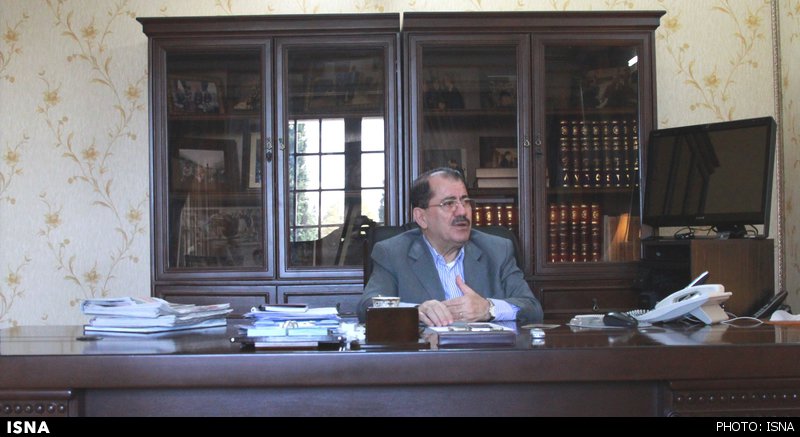
The President of KR, Vital file for Kurds fate
About this Dabbagh says: now the matter is not the non- or extinction of Masoud Barezani’s presidency period, but is the compilation and regulation of governing rules over the selection of the head of the Region and his authorities. The concern of head of Region and its extinction is a big problem in the Region; the leaders of the parties are looking for a solution for this problem, since this matter cannot be solved through statute and parliament.
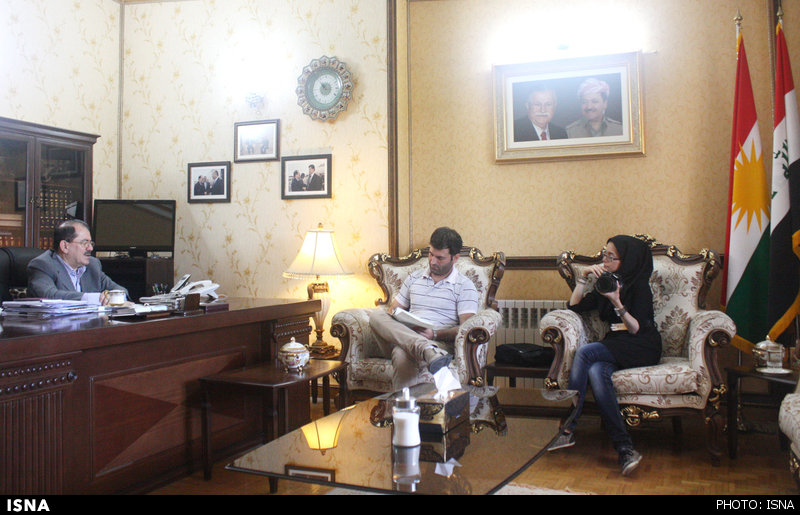
All hope that the last message of the President desiring all leaders to get together to solve the problem before August 20, (the date of Masoud Barezani’s presidency period end) wrap up. About the claim that Kurds have not any personification as qualified as Barzani to substitute him, he turned it down and say: we have enough men for the post of presidency; Mr. Barezani has very high position, whether to be a president or not he will be respected as Mr. Talibani which despite of his illness and having no authority but many interior and foreign authorities are commuting his home.
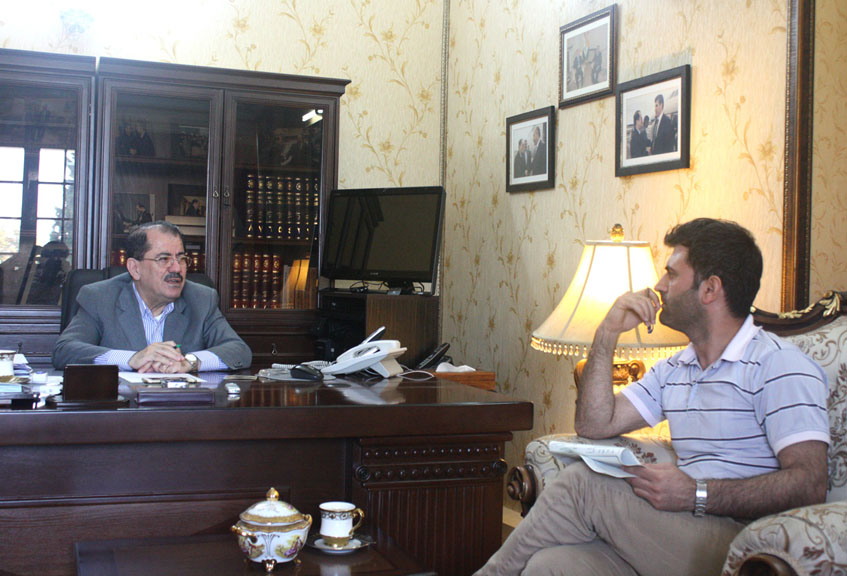
Barezani’s being or not being is not the matter, but is to define and compile the ruling mechanism of the presidency election and the range of its authorities. Now, the problem is that political system should be either chairmanship or parliamentary, these concerns have to be solved. Democrat party insists that Barezani reinstate in its position. It is true, he is a strong option for being the head of the Region but the statute does not allow this anymore.This also happened in Iran at the time of Hashemi presidency period.After being the president of Iran for two rounds, men were seeking to extend his presidency but the leader of Iran, Ayatollah Khamenei, ordered to obey the statute and it is not possible to change the constitution for one, and all accepted.
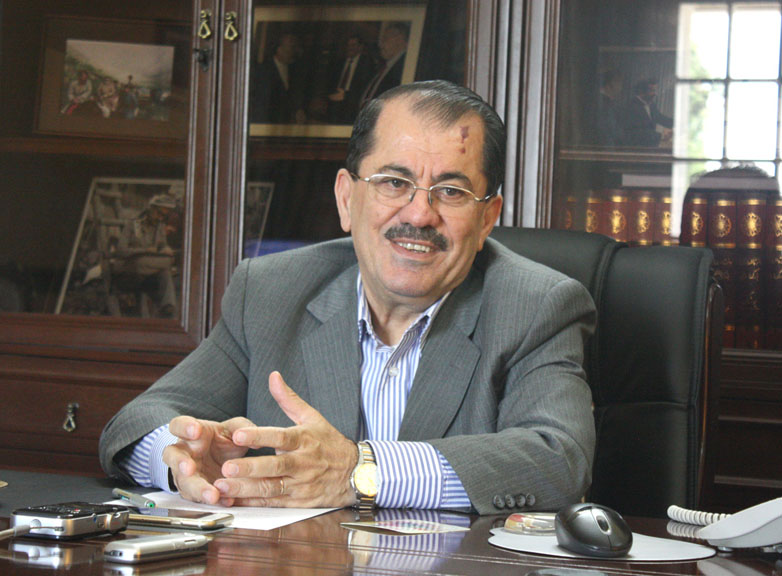
Some say that Barzani indeed are looking for to lean back on the Iraq presidency’ chair after his chairmanship of the Region ends and to take this post which now is under his rival party, namely, patriotic union of Kurdistan and instead to give up the post of the Region presidency to them. Nazem Dabbagh said to Isna: if one day Mr. Barzani wants to be the president of Iraq, I don’t think none of the Kurdish parties is opponent, but this has not been put yet. In my opinion this is not possible for me to say no if I am asked to agree with Mr. Barezani’s presidency on Iraq.
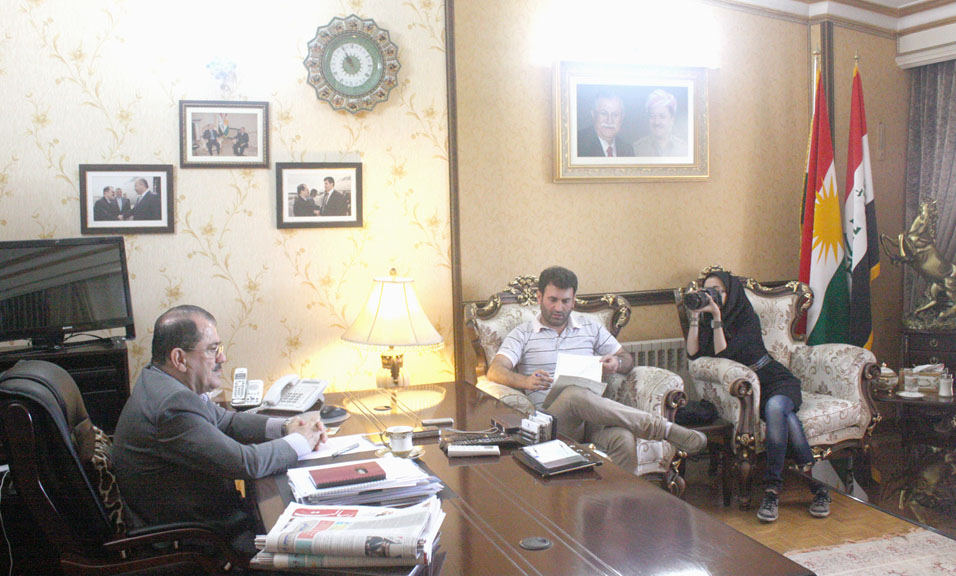
The actions of Iraq Prime Minister, Coup or Reformations
About the actions of Haydar Al-Ebadi in the field of confronting corruption Dabbagh said: Ebadi has taken important steps, but how to perform them is the matter. This action should be appreciated, but here is the problem that the change in Iraq will not happen unilaterally and without agreement among all groups. The question is his action will wrap up to a useful reformation for Iraq or this action is a political competitive and or party action.
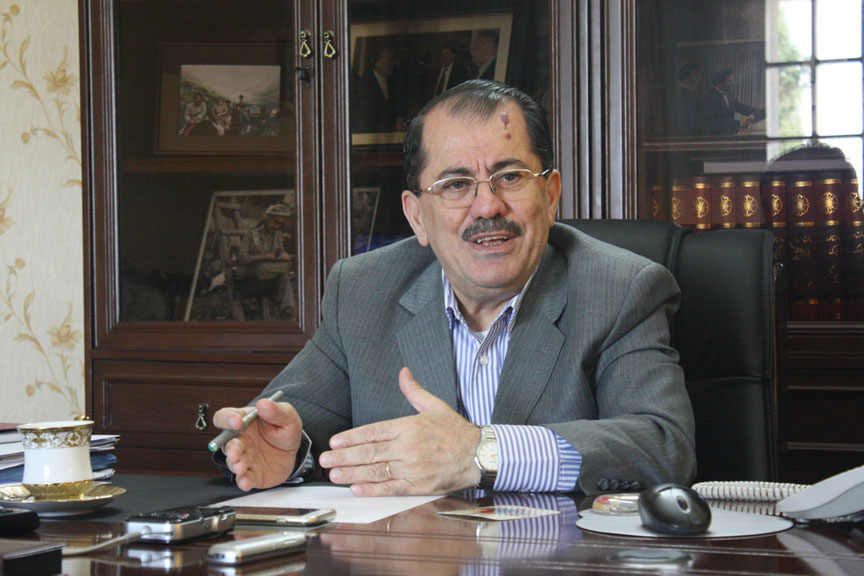
I feel that to perform this plan Al-Ebadi will face many problems. He added: When Al-Ebadi remove a minister or ministry he has to regard the portions of the elections based on the number of representative of political groups in the parliament, on the other hand, he has to give position to that groups somewhere else. This is why that we say the project of reformation should be accompanied with cooperation of all groups. If it occurs individually and if all groups cannot reach an agreement it will follow result worse than a coup in this current political condition of Iraq.
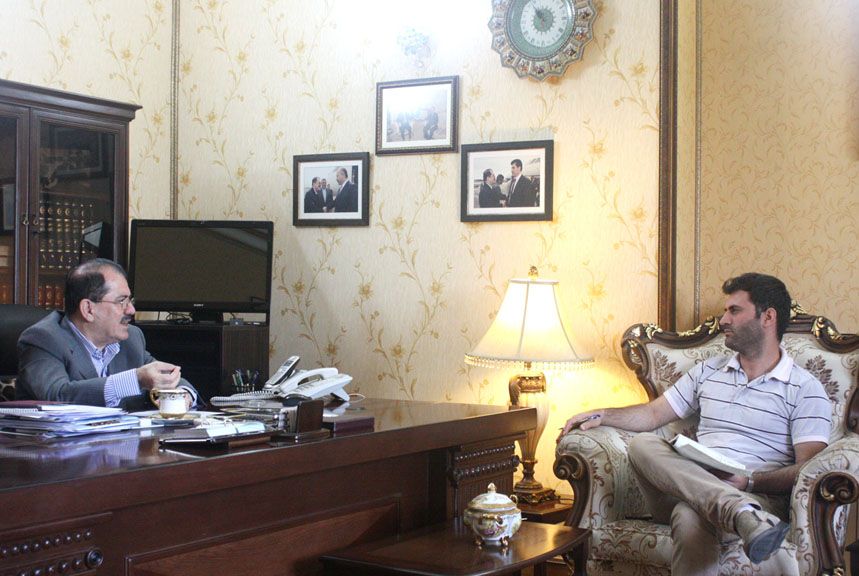
The Turkey’s Attack to P.K.K and the Region’s Role to Calm the Situations
Nazem Dabbagh says overt and closed attempts on the behalf the authorities of the region are ongoing until the new wave of violations between Ankara and P.K.K subsides. He added: as of a yet Turkey has attacked P.K.K more than 25 rounds. The Region authorities’ attempts to solve the problems between Turkey and Kurds refers to Turgut Ouzal, the eighth president of Turkey (1993-1989), which started through good offices of Jalal Talibani and Maoud Barzani; it led to good accomplishments those days.
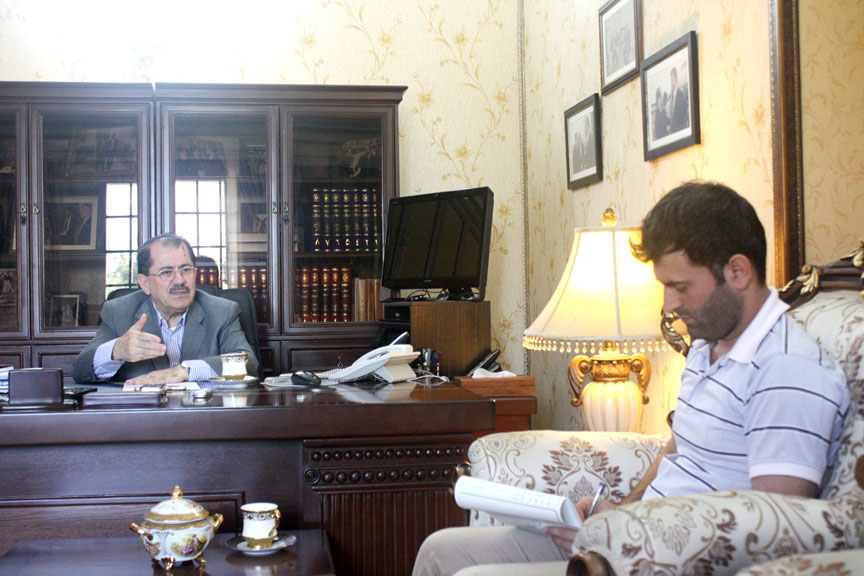
These attempts were more regarded at the time of Erdogan. All went well, but the lack of honest intention of both sides caused all process to be destroyed by a small pretext. The Suruc’s explosion occurred, and then P.K.K undertook the death of two Turkish soldiers. All were destroyed as a result of these two events. He added: Ankara should not bombed 150 villages of the Region and P.K.K bases on the pretext of this matter. In spite of these damages, the Region asked both sides to come to discuss. We believe that the best way is negotiation and Turkey and Kurds should come to do it. The KRG is not disable, and are trying to get both sides back to discuss and the negotiations should get again started or else a great mistake will happen.
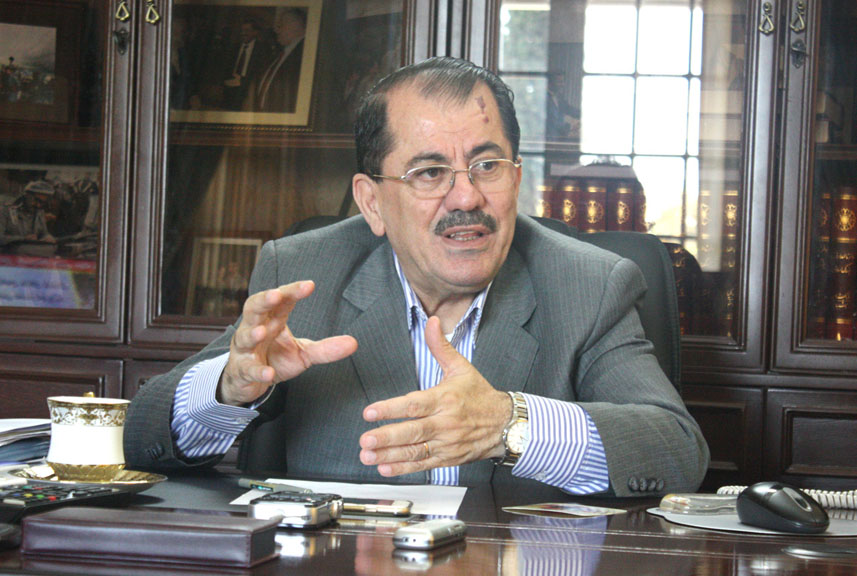
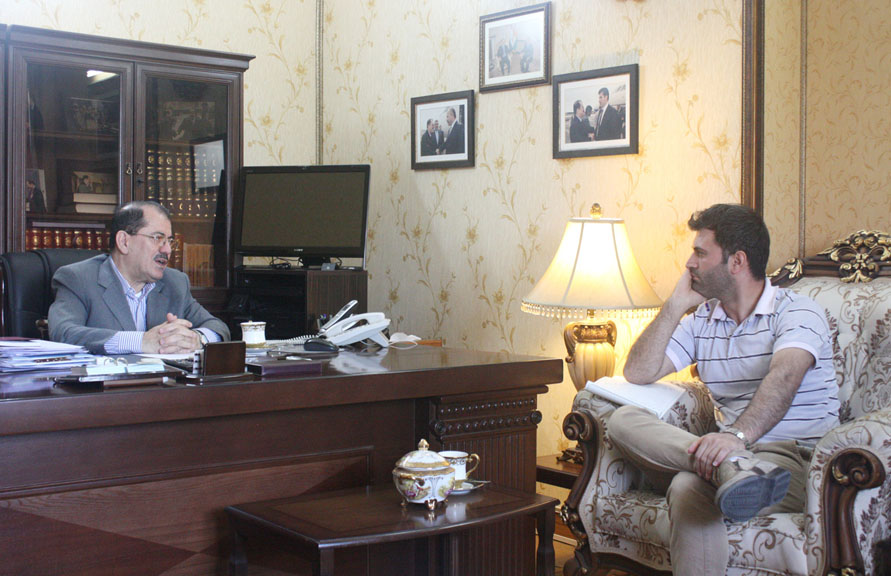
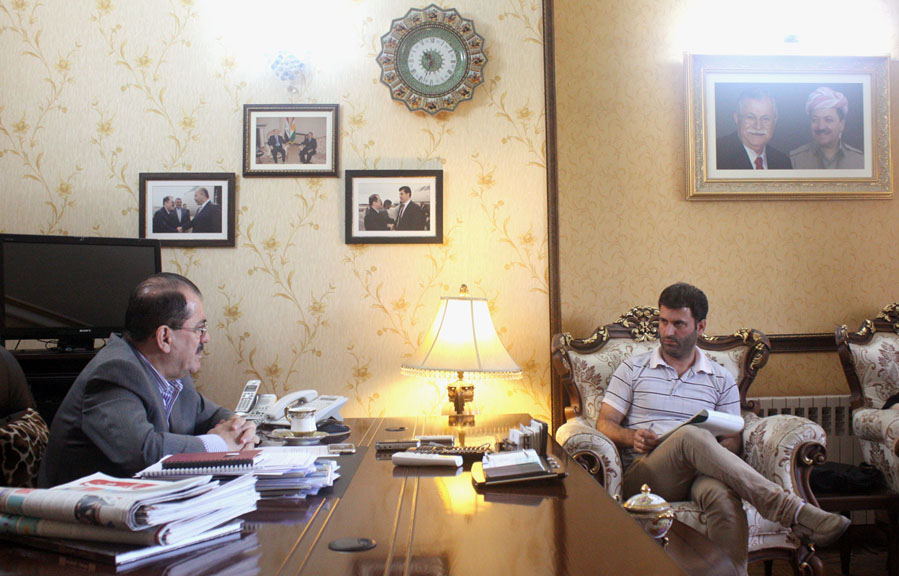
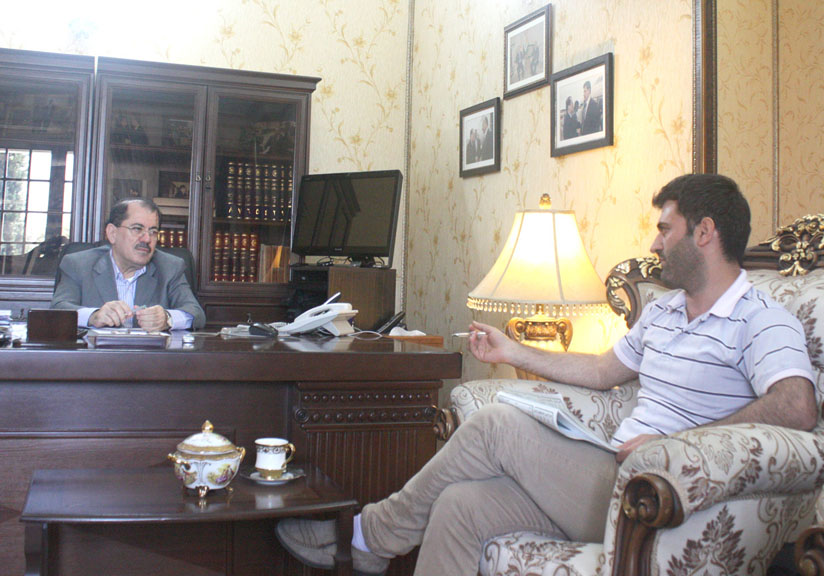
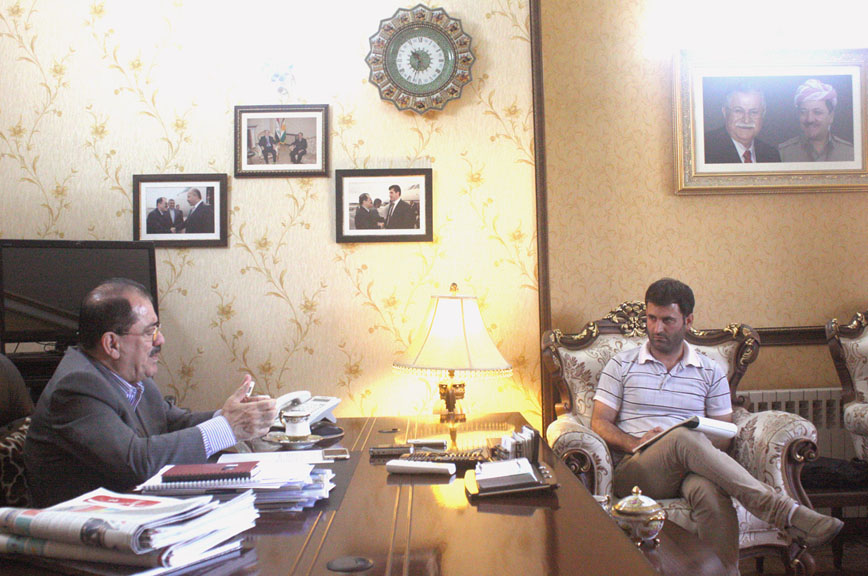
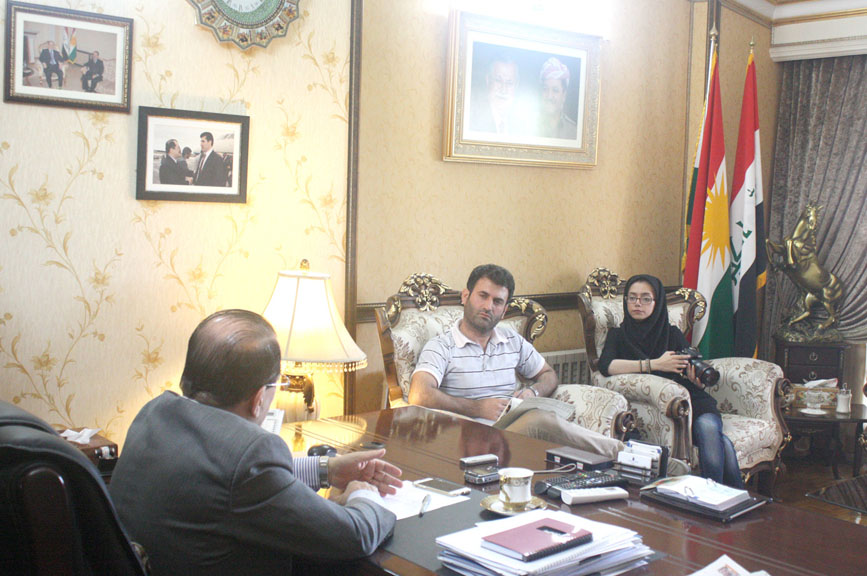
Raymond Adorno, the head of command headquarters of land forces of America army has recently said that the Disintegration of Iraq is the only solution to end the crisis in this country. The reporter of Jame Jam Press, relating this, had an interview with Mr. Dabbagh the representative of KRG in Iran of which as followed:
General Raymond Adorno, the head of command headquarter of land forces of America Army has announced disintegration is the only solution to accomplish the rapprochement between Shia and Sunni. Why has this put again now?
It is long time that the disintegration of Iraq has been being put in Medias, but I think it should be done by people and organizations’ satisfaction. To do so, Kurds, Arabians, Shia and Sunni have to make a decision that nobody has the right to give any ideas about this from out of the country. America thinks if Iraq get disintegration, the people of each part can fight better with ISIS and combat this terrorist groups, however, the disintegration of Iraq and the security concerns of the region relate to just Iraqis.
Can we say that America seek to disintegration of Iraq?
I can’t say with bluntness that America are looking for disintegration of Iraq, but after World War I and the fall of Ottoman government, the region got separated. In fact America is seeking to preserve its benefits, and go to everywhere that it has benefited.
Do Saudi Arabia, Turkey and Zionist Regime seek to disintegration of Iraq to penetrate this country and they want no strong central government to present?
I cannot say that Turkey and Arabia are looking for disintegration of Iraq, but is Zionist region to supply its benefits followed the disintegration of Arabian regions and the Middle East. In my opinion if central government is their ideal, they will not have any problem; since they want Sunni to overcome Iraq as at Saddam Hussein time, but when they see that Kurds share the destination of Iraq this is tough for them.
Has the betrayal of some inner groups to take ISIS not been an artificial work to make Iraq disintegrated?
The betrayal of this people causing ISIS to overcome the region and Kurdistan, was the betrayal against humanity and Islam, and I dare to say that Kurds has performed better to fight against ISIS.
What is the phase of ISIS position and of fighting it?
Sunni has cooperated ISIS to a high extent, and this has caused that fighting against this group has got more difficult. Of course the position of ISIS in the regions of Kurdistan is not good, for %95 of the regions occupied by this terrorist group has been freed. ISIS present more in Falluja and Al-Anbar the Army of America and Iraq has not been able to have an outcome in these regions yet; however the second stage of freeing Al-Anbar has started.
Why do Iraqis opposite to corruption in their country?
Nobody dares to be opponent to reformation and fighting against corruption in Iraq; of course this is a fact that these attempts are made to act to decrease the authorities of one side and one’s domination on others. Many interpret these attempts as coup, but I personally support reformations.
What can government do about this?
If government has a complete cooperation with political groups in Iraq, it can fight against corruption. This matter is not limited to fire just few authorities or remove the deputies of the President but the government has to monitor the ministries more which are given great budgets, like electricity, commercial, health ministry and municipal which have to offer more services to people.
Ilna: the measurement of Iran and KR’s economic cooperation, problems between them, and the crisis of ISIS effectiveness on economic cooperation is the news subject about which Ilna reporter talked to Nazem Dabbagh, the representative of KRG of Iraq in Iran. With regards to the position of economic of KRG after ISIS’s attack Dabbagh said it caused many problems to KR. The Region, presently, has got an 1150km border with ISIS. This has caused to decrease the economic relations. Breaking off the Region’s budget by Iraq central government, besides war expenditure, has caused KRG not been able to start rebuild industrial and development projects. Even the presence of tourists in KR has decreased and continued up to now. Unfortunately financial crisis has caused that more than 250 companies have gone bankrupt which has increased the unemployment in the Region. In such situations Iranian companies have got into problems too.

Concerning possible fields of KRG and Iran’s cooperation in the space of post-sanctions Dabbagh said: according both security, policy and economic there are conditions to be available to cooperate in these fields. But the termination of Iran’s sanctions is not an event to occur in a few weeks, so we should wait for the agreements to be performed.
In a response to a question relating left tendencies of Kurdish parties in the past, Dabbagh replied: presently I don’t want to say on the behalf of parties like Patriotic Union. However, generally speaking, economic and social thoughts dominating Kurdistan are more willing to Democrat Socialist. In Kurdistan we basically believe in private sector as well as economic freedoms. For this has caused our country to grow. We no longer look for a Socialistic or Marxist system. Marxist’s period has gone over. This theory even did not benefit to Soviet. We also use Liberalist doctrines in the field of economy. We have unilaterally opened the Kurdistan Region’s border to our neighbors, especially Iran. Presently if one wants to enter the Region for economy activities and investment, he does not need passport. About the level of the KR and Iran’s economic cooperation Dabbagh added: it was good in the past but not now. However we expect to take pace forward improvement, as well. He said: the level amounted to 6 billion dollars and we have planned to grow this to 10 billion dollars. Before ISIS around 5 billion dollars of that was met. Of course the transfer of money was effective.
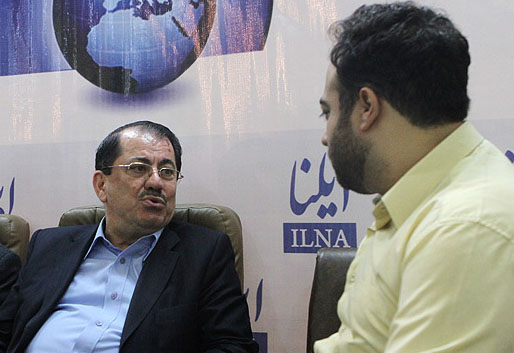
Latest News
- President Nechirvan Barzani's New Year Message
- New year message from Prime Minister Masrour Barzani
- President Nechirvan Barzani welcomes the New Consul General of Iran
- President Nechirvan Barzani meets with Dutch Defence Minister Ruben Brekelmans
- President Nechirvan Barzani meets İsmail Beşikçi
- President Nechirvan Barzani meets Italian Defense Minister Guido Crosetto
- Nechirvan Barzani: The flag of Kurdistan symbolizes our shared values
- President Nechirvan Barzani meets Commander of Coalition Forces
- President Nechirvan Barzani welcomes new Ambassador of the Czech Republic
- President Nechirvan Barzani meets with Admiral Sir Tony Radakin, UK Chief of Defense Staff
- President Nechirvan Barzani meets with German Defense Minister Boris Pistorius
- President Nechirvan Barzani attends ceremony for the reopening of Notre-Dame Cathedral
- President Nechirvan Barzani bids farewell to the departing Italian Consul General
- President Nechirvan Barzani receives the new Ambassador of the United Arab Emirates
- President Nechirvan Barzani receives the new Ambassador of Italy
- President Nechirvan Barzani meets with the Russian Ambassador to Iraq
- Nechirvan Barzani Commemorates the late Professor Mustafa Zalmi as a Beacon of Reform in Islamic Theology and Jurisprudence
- Nechirvan Barzani attends the 10th Anniversary of the American University of Kurdistan
- President Nechirvan Barzani bids farewell to departing US Ambassador
- President Nechirvan Barzani Meets with UK Home Secretary Yvette Cooper
- President Nechirvan Barzani in Vienna: Austria aims to enhance diplomatic and trade relations
- Kurdistan Region President meets with President of Austria
- President Nechirvan Barzani meets with Foreign Minister of Austria
- President Erdoğan reaffirms Türkiye’s continued support for Iraq and the Kurdistan Region
- President Nechirvan Barzani’s message on the 126th anniversary of Kurdish journalism
- President Nechirvan Barzani at the Sulaimani Forum: The country must bring us all together
- President Nechirvan Barzani meets with European Union Ambassador
- President Nechirvan Barzani receives French Ambassador
- President Nechirvan Barzani visits Iranian Consulate General to pay respects to victims of Kerman terrorist attack
- President Nechirvan Barzani receives outgoing French Ambassador


